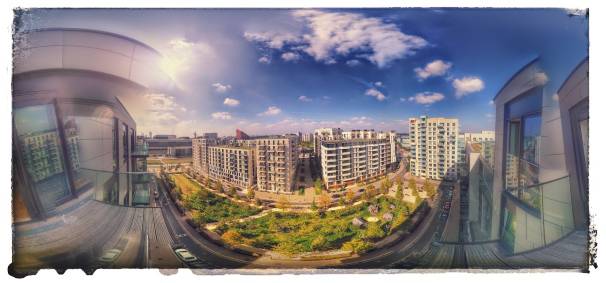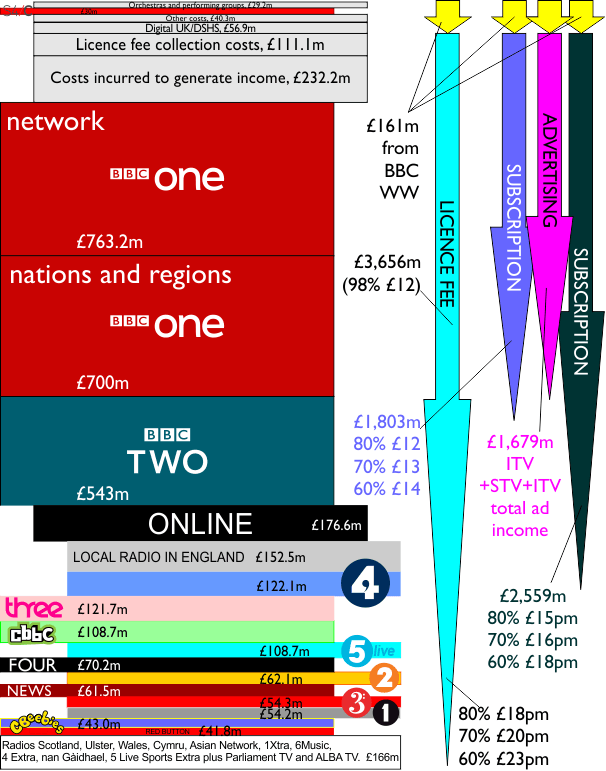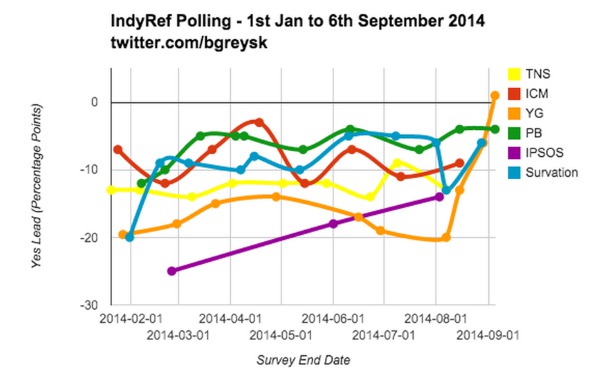If Scotland votes Yes, what would happen to Free TV in the rest of the UK?

What will happen to the free TV in the rest of the UK? Photograph: Shutterstock
The psephologist in me is not that convinced [1], but with stories around today such as BBC News - Scottish independence: Pound falls after referendum poll it does seems like a time to look at the view of the poll from the England-Wales-Northern Ireland (EWNI) side.
See What could happen to Freeview if Scotland voted to become independent? and An Independent Scot would still be able to watch the BBC on satellite, surely? for the Scottish perspective.
The view from London
 On the whole I am disinterested in the outcome (as I live in London), of course, but I think it worth wondering what could happen.
On the whole I am disinterested in the outcome (as I live in London), of course, but I think it worth wondering what could happen.
Of course the vote is just the start of a process. There is pre-nuptial agreement in this situation. If there was a Yes vote in 10 days, then a negotiation would start.
Weighty matters (nuclear submarines, membership of NATO and the EU) will take precedence, but at some point the subject of the divorcing nations TV and radio will be addressed.
As you probably well know, the Scottish legal system is separate to that in England and Wales. If laws or contracts have been drawn up it is quite likely that they will be able to continue in the two jurisdictions as if nothing had happened.
"Border" television
The most obvious question is about the Channel 3 "Border" licence, which is held by ITV plc. The Scotland part of this covers 100,000 homes (0.4% of the UK total) and it seems likely that ITV might have to make arrangements to sell this to STV plc.Arqiva
The six Freeview multiplexes are allocated to their owners in a number of ways. It is possible that the new Scottish government will just allow the current system to continue, so Arqiva will continue to largely own and wholly operate the system (ITV plc will continue to licence the "SDN" multiplex).There is a good question about the "Digital 3 and 4 Ltd" arrangements in Scotland: this is a good example of where an decision about splitting an existing contract with legal commitments (to Arqiva) and service obligations but little in the way of liquid assets might get bogged down.
Channels 4 and 5
However, in the extreme example that Scotland chooses to close down Freeview (to use for 4G broadband or a pay TV service) the broadcasters that operate on "gifted" bandwidth and rely on the advertising income they make would see a 8.3% cut in their funding. This would be Channel 4 and Channel 5 in particular. It could be possible that in the longer term that selling advertising space into what is a "foreign country" might carry additional costs and risks.ITV plc
As ITV plc does not broadcast Channel 3 in Scotland, but resells the programmes it makes to STV, this relationship will be the least likely to change for an English company.EWNI-BBC
 As for the BBC, it is possible that the discussions after a Yes vote would allow the BBC to continue as it is, with the people of Scotland paying the TV Licence and the revenue from this being handed over to a single body for the Scotland and EWNI.
As for the BBC, it is possible that the discussions after a Yes vote would allow the BBC to continue as it is, with the people of Scotland paying the TV Licence and the revenue from this being handed over to a single body for the Scotland and EWNI.
This seems an unlikely outcome. From a EWNI perspective if the BBC in Scotland is legally replaced by another broadcaster, and the licence fee handed over to that, the question is how services would be changed.
One important question would be as to the nature of the transfer of BBC assets to the Scottish State Broadcaster (SSB). It could be that the assets are "ceased" and kept (given that some claim the Scottish Government will not accept any UK dept).
£161m a year?
It seems likely that the EWNI-BBC would have 8.3% (£332m) chopped from the budget. However, this would be tempered against the savings made from not having to provide an extensive terrestrial transmitter network in Scotland, not having to collect the fee in Scotland (£9m).The SSB might demand 8.3% of BBC Worldwide, which would cost EWNI-BBC another £13m a year in lost income.
However, even if BBC Scotland (plus BBC Alba, the Scottish radio stations) costs as much as £175m, this would leave a shortfall in the BBC budget of £161m.
However the question would then be: can the BBC charge SSB at least £161m a year to provide their channels? Would the SBS want the BBC News channel, or just the pick of shows like Strictly and Doctor Who?
If SSB pays only £50m for very selected BBC content, the £111m hole in the BBC budget would all of English local radio, 90% of Radio 4, all of Radios 1 AND 3, or putting up the TV Licence by £5.

A Scottish Yes could mean a fiver more every year on the TV Licence for the rest of the UK.
Another change that the EWNI-BB would no longer be required to make programmes in Scotland, so this could mean more money spent in other parts of England, Wales and Northern Ireland.
You can see the figures on the TV Licence decriminalization: just how much is it going to cost you? page.
In conclusion, the vote in 8.3% of the UK in 10 days could inflict changes on the level of the TV Licence, the programmes you are shown on TV, where people are employed to make TV.
It is hard not to disagree that such a change is being made without consulting the 91.7% of voters who will see things changed.
[1] Scotland: Don't panic yet - the YouGov poll might be a red herring - Mirror Online

Help with TV/radio stations?
In this section
| Is an installation company allowed to just have an 0800 number? | 1 |
Monday, 8 September 2014
C
Corin6:50 PM
Perhaps it would be useful to be reminded how the Freeview system and TV reception licencing system is implemented in other non-UK administrative areas viz Isle of Man, Jersey, Guernsey, and Sark?
Clearly the Isle of Man has responsibility for its own broadcasting since commercial radio has long existed there in the form of Manx Radio, since June 29th, 1964, and in 2011 decided to keep the TV receiving licence.
TV Licencing gives the impression that the typical form of attire for women in the Channel Islands is the sari.
TV Licensing - If you live on the Channel Islands or Isle of Man
| link to this comment |
@Corin: Yes, that might be interesting. I'm sure I know how it works, but I'm going to read up on it again just to make sure I'm not making an assumption!
| link to this comment |
Tuesday, 9 September 2014
J
John Martin1:05 PM
Well not really bothered if they get independence or not. Another £10 on the fee would not be the end of the world. Freeview might even get better with less Scottish voices LOL
| link to this comment |
P
PJH3:37 PM
Scotland could end up like the Republic of Ireland's Saorview service, with around 6 free to air DTT channels.
Not forgetting all those rights issues etc., which people in the ROI seem obsessed with and the reason why ROI channels aren't free to air on 28.2 degrees east.
The whole thing could be a sorry mess with regard to broadcasting.
| link to this comment |
M
Mike Dimmick6:09 PM
Corin: The relevant UK Acts of Parliament - the Broadcasting Acts of 1990 and 1996, and the Communications Act of 2003 - were extended to the Channel Islands and the Isle of Man through Orders-in-Council. The orders did in some cases modify the text compared to the UK versions (over and above the simple changes to replace 'United Kingdom' with the corresponding Dependency's name).
This gives the BBC power to enforce TV licensing in the dependencies, and gives Ofcom the power to licence TV multiplex services and broadcasting services, under the same system as the UK.
Scotland, if it becomes independent, will be a completely separate nation with no legal recourse to or by the Westminster parliament, or to the UK Privy Council. It will initially inherit UK legislation for, although Scotland has a separate legal system of courts and procedure, the laws themselves rarely make specific provisions for Scotland.
The exceptions are typically where a different official has power in Scotland compared to England and Wales or Northern Ireland, or a different term is used in Scots law. For example, Communications Act 2003 section 366 ("Powers to enforce TV licensing") begins "If a justice of the peace, a sheriff in Scotland or a lay magistrate in Northern Ireland is satisfied by information on oath [...]". Subsection 11 then says "In the application of this section to Scotland, the reference in subsection (1) to information on oath shall have effect as a reference to evidence on oath."
The licences issued by Ofcom to the Channel 3 companies, Channel 4, Channel 5, the local broadcasters and the multiplex operators all state that the licence is governed by English law. This includes the Scottish Channel 3 licences and the Glasgow local TV licence held by STV. I'd expect the Edinburgh licence to say the same, when it gets published.
| link to this comment |
At some point in the past the SNP has said it would honour existing broadcasting contracts until expire and then would re-licence. Similarly for the BBC it has in the past said it would respect the current charter until it expires and then would expect it to hand over the the SBS.
Of course all of that could get changed in the process of what I suspect would be quite fraught independence negotiations. I think the BBC assets and licence fee will be the hardest but Channel 4 is also state owned so will be in the mix for division of assets as well.
Going forward untangling pre-independence rights to content will be "interesting" (e.g. if (say) ITV had purchased rights for a programme in perpetuity for "UK" broadcast). Given how IPR tracking is already such a major pain for most media companies I suspect independence will do little for reducing anyone's costs but will please lawyers on both sides of the border.
| link to this comment |
@Martin: "I think the BBC assets and licence fee will be the hardest but Channel 4 is also state owned"
I think you will find that "in law" niether the BBC not Channel 4 are "state owned".
Channel 4 is owned by the Channel 4 Corporation in their words and is "publically owned" About Channel 4 - Channel 4 - Info - Corporate . It has "not-for-profit status" so it would be impossible to set a value on it in the "normal" sense as you can't value a business that doesn't have a profit (as the value of shares are dependant on the dividend they would pay).
The BBC is created by a Royal Charter that is renewed every decade. Thus the UK operations are a "body corporate", which is technically not a state asset. Royal charter - Wikipedia, the free encyclopedia
Plus, once again, the BBC is a non-profit making entity, so it would be impossible to price it under the normal rules because any shareholders wouldn't receive a dividend.
| link to this comment |
MikeP
9:36 PM
9:36 PM
Briantist
It seems that some do not differentiate between the status of some entities, such as the BBC and Network Rail, etc. I used to be a consultant for Network Rail and they are not a 'not for profit' organisation but rather a 'not for dividend' entity. That then means they can make a profit but it has all to be re-invested into the maintenance and operation of the rail network and the main stations. Some of this 'profit' is now being put back into the 'business' by the electrification of the London to Cardiff and Penzance services (currently run by the First Great Western franchise) and there are further projects being planned for the future of a similar scale.
It will be interesting to see how the Scottish vote will affect track maintenance and provision as it is more costly per mile there than in most of England and much of Wales.
| link to this comment |
P
Peter10:11 PM
You assume there could be any terrestrial broadcasting in Scotland. The allocation of frequencies by the EBU has been to the UK and Scotland would have to both join the EBU and negotiate its own allocations of frequencies. Like the EU, there is no guarantee that the present arrangements could or would continue for a new country seeking membership.
As far as allocation of funds to the residual BBC in EWNI, there is at the moment some "top slicing" of the amount that has been allocated to the provision of super fast broadband. The new arrangements could see that restored to the BBC and therefore the suggested £5 increase in the licence fee because of separation could be ameliorated.
With the comparatively small number of people using freesat, I do not see that it would be entirely uneconomic for those who own generic receivers to get a free replacement with an encryption card slot (it would cost even less if this were only available to those not able to receive from a main terrestrial transmitter). A similar arrangement to the Sky carriage of BBC channels in Eire could then be implemented for those in Scotland who wish to receive BBC programming. Transmitters near the border could be reconfigured to avoid overspill except to the closest borderlands of Scotland.
Programme makers may well abandon Scotland - the BBC units currently making shows there would obviously move south or to NI - it seems daft to me that Mrs Brown's Boys is recorded in Scotland and the new Titantic studios complex would no doubt welcome the business. The upside of course is that in England we will no longer have to endure the bastard offspring of the White Heather Club every New Year.
| link to this comment |
Wednesday, 10 September 2014
M
MB6:28 AM
Peter: All the UHF frequencies in use for Freeview in Scotland are already fully co-ordinated with the rest of the UK and the rest of Europe - if Scotland gains independance the ITU/EBU will simply transfer the usage agreement to the new Scottish government. They will not withdraw and then attempt to reallocate channels that are already fully co-ordinated. Frequency allocation will remain the same.
As for whether the BBC will maintain its presence, or whether any other organisation will be able to take over, thats altogether a different issue!
| link to this comment |
Select more comments
Your comment please!